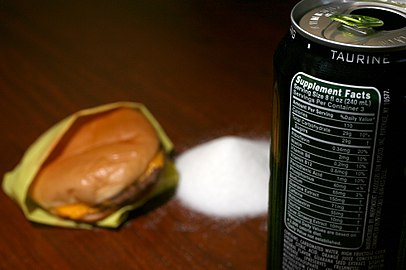en.wikipedia.org
Always private
DuckDuckGo never tracks your searches.
Learn MoreYou can hide this reminder in Search Settings
All regions
Argentina
Australia
Austria
Belgium (fr)
Belgium (nl)
Brazil
Bulgaria
Canada (en)
Canada (fr)
Catalonia
Chile
China
Colombia
Croatia
Czech Republic
Denmark
Estonia
Finland
France
Germany
Greece
Hong Kong
Hungary
Iceland
India (en)
Indonesia (en)
Ireland
Israel (en)
Italy
Japan
Korea
Latvia
Lithuania
Malaysia (en)
Mexico
Netherlands
New Zealand
Norway
Pakistan (en)
Peru
Philippines (en)
Poland
Portugal
Romania
Russia
Saudi Arabia
Singapore
Slovakia
Slovenia
South Africa
Spain (ca)
Spain (es)
Sweden
Switzerland (de)
Switzerland (fr)
Taiwan
Thailand (en)
Turkey
Ukraine
United Kingdom
US (English)
US (Spanish)
Vietnam (en)
Safe search: moderate
Strict
Moderate
Off
Any time
- calorie
noun
- Any of several approximately equal units of heat, each measured as the quantity of heat required to raise the temperature of 1 gram of water by 1°C at 1 atmosphere pressure.
- The unit of heat equal to 1/100 the quantity of heat required to raise the temperature of 1 gram of water from 0 to 100°C at 1 atmosphere pressure.
- The unit of heat equal to the amount of heat required to raise the temperature of 1 kilogram of water by 1°C at 1 atmosphere pressure.
noun
- Any of several approximately equal units of heat, each measured as the quantity of heat required to raise the temperature of 1 gram of water by 1°C at 1 atmosphere pressure.
- The unit of heat equal to 1/100 the quantity of heat required to raise the temperature of 1 gram of water from 0 to 100°C at 1 atmosphere pressure.
- The unit of heat equal to the amount of heat required to raise the temperature of 1 kilogram of water by 1°C at 1 atmosphere pressure.
- A unit of energy-producing potential equal to this amount of heat that is contained in food and released upon oxidation by the body.
- The gram calorie or small calorie, a non-SI unit of energy, equivalent to approximately 4.2 joules. This unit was widely used in chemistry and physics, being the amount of energy needed to raise the temperature of 1 gram of water by 1 °C.
- Kilogram calorie or large calorie. A unit of energy 1000 times larger than the gram calorie. It is equivalent to the gram kilocalorie, approximately 4.2 kilojoules.
The American Heritage® Dictionary of the English Language, 5th Edition • More at WordnikvWas this helpful? - Learn about the origin, meaning and usage of the calorie, a unit of energy that measures the heat needed to raise the temperature of water. Find out how to convert calories to joules, BTU, kW⋅h and eV in different contexts.
mayoclinic.org
Estimate the number of daily calories your body needs to maintain your current weight with this online tool. Enter your age, height, weight and sex, and get your personalized calorie recommendation based on Harris Benedict Equation and Institute of Medicine Dietary Reference Intakes.merriam-webster.com
Merriam Webster
https://www.merriam-webster.com › dictionary › calorie
Learn the origin, usage, and examples of the word calorie, a unit of heat and energy. Find out the difference between small and large calories, and how to cite and translate the term.eatingwell.com
Mar 8, 2023Calorie-Dense vs. Nutrient-Dense . A food or beverage considered calorie-dense contains a high number of calories per serving; some of these foods also have few nutrients. According to the American Heart Association, these foods are often high in saturated fat, added sugars and sodium. Several examples of calorically dense, nutrient-poor foods ...calculator.net
Calculator.net
https://www.calculator.net › calorie-calculator.html
Use this calculator to estimate the number of calories you need to consume each day based on your age, gender, height, weight and activity level. Learn how to use calorie counting as a means for weight loss and get tips on nutrition and exercise.justfit.app
To calculate calorie intake for when the body is at rest, the resting metabolic rate is first determined. This result is then multiplied by an activity factor that corresponds to the individual's level of exercise, which can range from high-intensity workouts to low-intensity activities, or anywhere in between.This activity factor typically ranges from 1.2 to 1.95.healthline.com
Apr 25, 2024Your ideal calorie intake depends on various factors, such as age and activity level. Most females at least 1,600 daily calories to maintain weight, while males may require at least 2,000.webmd.com
Dec 12, 2024Learn how many calories you need to eat each day to maintain, lose, or gain weight, based on your age, sex, and activity level. See a chart of estimated calorie needs and get tips on how to balance your calories in and out.livescience.com
Calories are units of energy that food provides. Learn how many calories you need, what foods are high or low in calories, and how to balance your calorie intake for weight control.barbellmedicine.com
Barbell Medicine
https://www.barbellmedicine.com › resources › calorie-calculator
Technically speaking, a calorie (with a lower-case c) is the amount of energy required to raise the temperature of 1 milliliter of water by 1 degree Celsius. Our food contains thousands of times more energy than this, so rather than using the term "kilocalories" when measuring the energy in food, this term has been abbreviated as Calories ...Can’t find what you’re looking for?
Help us improve DuckDuckGo searches with your feedback
